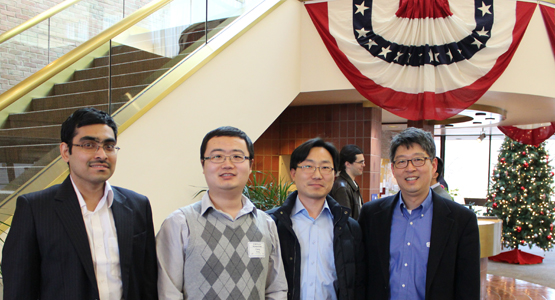LNF User Symposium – sharing ideas and celebrating innovation
The 2014 LNF (Lurie Nanofabrication Facility) User Symposium highlighted the cutting-edge research enabled by Michigan's world-class facility.

 Enlarge
Enlarge
The 2014 LNF (Lurie Nanofabrication Facility) User Symposium highlighted the cutting-edge research enabled by Michigan’s world-class facility. The Symposium included technical talks, a poster session, and the opportunity for discussion and networking. Attendees represented many departments throughout the University, as well as industrial users of the LNF.
Stephen Forrest, Paul G. Goebel Professor of Engineering, presented the event’s keynote address,Making small things big in the world of organic electronics. In this talk, Prof. Forrest discussed several important demonstrations of organic electronic devices that span an unprecedented range of dimensions.
Understanding phenomena at a quantum scale, explained Prof. Forrest, can lead to solutions to larger and larger applications. Organic technology in wall-mounted displays and lighting, solar cells that cover the sides of buildings, flexible electronic circuits that can mimic the eye and “see around corners,” and printing literally kilometers of circuits as if they were newsprint are all new and exciting challenges that device physicists, applications engineers, and specialists in advanced manufacturing face in this rapidly developing global industry.

 Enlarge
Enlarge
The poster session presented the diverse work of graduate students and researchers who use the facility and rely on its equipment to build next-generation devices. Three participants were winners of this year’s LNF Users Symposium Poster Awards:
Cheng Zhang, 1st place, Ultrathin and Smooth Al-doped Silver Based Metamaterials Plasmonic Devices. Cheng, Ph.D. student, works with ECE professor Jay Guo.
Hyeun Joong Yoon, 2nd place, Capture and Release of Circulating Tumor Cells by Temperature Sensitive Graphene Oxide Polymer Composites. Hyeun, research fellow, works with Chemical Engineering professor Sunitha Nagrath.
Md Zunaid Baten, 3rd place, High-Temperature Electrically Pumped Polariton Lasers. Md, Ph.D. student, works with ECE professor Pallab Bhattacharya.
Several researchers delivered technical presentations throughout the day. The following talks gave attendees a detailed look at current work in the LNF:
Commercialization of Superconducting Nanowire Photon Detectors: LNF as an enabling resource for one Michigan start-up, by Aaron Miller (Co-founder of Quantum Opus).
Comprehensive Single Cell Assay Chips for the Study of Cancer Metastasis and Heterogeneity, by Yu-Chih Chen (ECE Ph.D. student working with Prof. Euisik Yoon).
Sub-nm Resolution Patterning on Non-Planar Substrates Using Electron-Beam Lithography, by Vishva Ray (LNF Engineer).
GaN Integrated Microsystems for RF Applications, by Azadeh Ansari (ECE Ph.D. student working with Prof. Mina Rais-Zadeh).
III-Nitride based high temperature single-photon sources, by Saniya Deshpande (ECE Ph.D. student working with Prof. Bhattacharya).
MicroOptofluidic Ring Resonators for Detection of Volatile Organic Compounds, by Kee Scholten (Applied Physics Ph.D. student working with Prof. Ted Zellers).
About the LNF
The Lurie Nanofabrication Facility is a state-of-the-art cleanroom facility for research on micro- and nanotechnology. The LNF is available for use by government, industry, and university research groups. Equipment and processes are available for research on silicon integrated circuits, MEMS, III-V compound devices, organic devices and nanoimprint technology. The facility also is available for researchers from non-traditional disciplines to make use of our processes, such as metal and dielectric coatings, vacuum processes, fabrication of micro and nano components and metrology tools.
 MENU
MENU 
